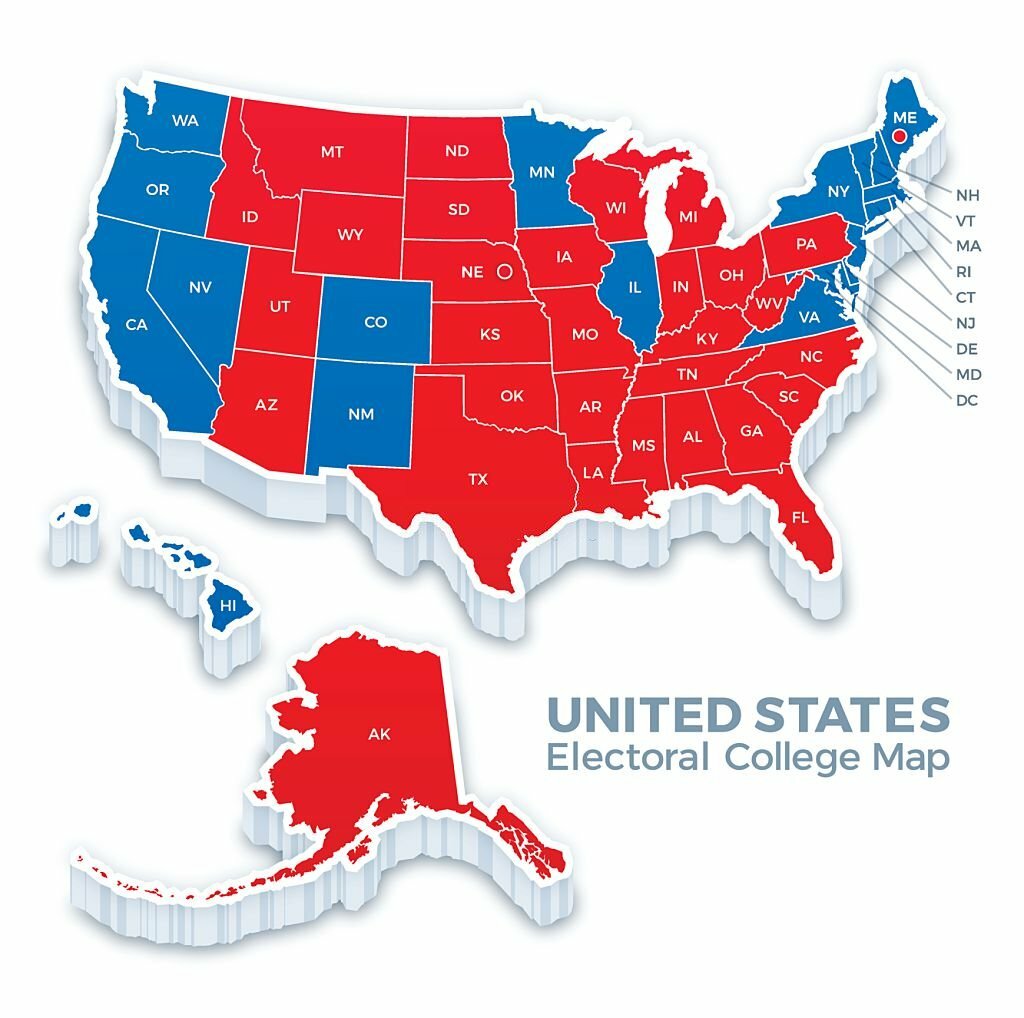Do you know what role the Electoral College plays in U.S. elections? It’s a system that elects the President and Vice President of the United States, using electors from each state who cast their votes based on the popular vote. This unique system was established by our Founding Fathers as a compromise between direct popular vote and congressional selection. However, it has faced criticism for allowing candidates to win without winning the popular vote. Let’s delve into the fascinating world of the Electoral College and explore its role in shaping our nation’s leadership.
Historical Background of the Electoral College
The Electoral College was established by the Founding Fathers to ensure a balance between the popular vote and the influence of smaller states in presidential elections. Its historical significance dates back to the Constitutional origins of our nation. The voting process in the Electoral College involves electors from each state casting their votes based on the popular vote within their respective states. This system has a significant impact on smaller states, as it prevents larger states from overwhelming their voices in presidential elections. Additionally, the Electoral College plays a crucial role in presidential campaigns. Candidates focus on winning key swing states and strategically allocating resources to secure enough electoral votes for victory. Understanding the role of the Electoral College is essential for comprehending how our nation’s presidents are elected.
Composition and Structure of the Electoral College
One important aspect of the electoral college is its composition and structure. The electoral college is made up of electors who are chosen by each state to cast their votes for the President and Vice President. These electors are determined by a state’s population, which means that the impact of demographics on the electoral college cannot be ignored. Additionally, the role of faithless electors in the electoral college is significant. These are individuals who do not vote according to their state’s popular vote, which can potentially change the outcome of an election. Furthermore, tie votes in the electoral college have historical significance as they have only occurred a few times in history and have led to unique outcomes. Small states also play a crucial role in the electoral college as they have a disproportionate influence due to their minimum number of three electors. Finally, third-party candidates can influence the electoral college by siphoning off votes from major party candidates and potentially impacting election results.
How the Electoral College Determines the President
To understand how the Electoral College determines the President, you should know that it is based on the number of electors each state has. The role of the popular vote is crucial in this process. When voters cast their ballots, they are actually choosing a slate of electors who will represent their state in the Electoral College. These electors then vote for the President based on the outcome of the popular vote in their respective states.
State laws play an important role in guiding how these electors are chosen and how they must vote. However, occasionally there are “faithless electors” who go against their state’s popular vote and cast their votes differently.
Ultimately, it is Congress that counts and certifies these electoral votes to determine the President-elect. This process takes place in early January following the November election. In rare cases where no candidate receives a majority of electoral votes, then Congress plays an even greater role by conducting a contingent election to decide who becomes President.
Criticisms and Controversies Surrounding the Electoral College
You should be aware of the criticisms and controversies surrounding the Electoral College system. While it may seem like a fair and democratic way to elect a president, there are flaws in the system that have been heavily debated. Public opinion on the Electoral College is divided, with some arguing that it gives too much power to certain states and undermines the principle of one person, one vote. Others argue that it leads to voter disenfranchisement, particularly for minority groups who may not have their voices adequately represented. The impact on minority representation is a significant concern, as studies have shown that communities of color often face disproportionate influence under this system. It’s important to critically examine these issues and consider potential alternatives for a more equitable electoral process.
| Flaws in the System | Public Opinion | Voter Disenfranchisement |
|---|---|---|
| Overrepresentation | Divided | Underrepresented |
| of certain states | minority voices | |
| Impact on Minority Representation | Disproportionate Influence |
|---|---|
| Concerns about fair representation | Certain states hold more sway |
| for marginalized communities | in determining election outcome |
Arguments in Favor of the Electoral College
The arguments in favor of the Electoral College system include its ability to provide a voice for smaller states and maintain a balance of power between rural and urban areas.
- It ensures that all states have a say in the election, preventing larger states from dominating the process.
- It upholds the constitutional framework established by our founding fathers, who designed it as a compromise between direct popular vote and congressional selection.
- It promotes voter equality by giving each state representation in proportion to its population.
- It prevents candidates from focusing solely on densely populated urban areas and neglecting the concerns of rural communities.
Despite these arguments, there are also valid criticisms of the Electoral College system. The ongoing representation debate questions whether it truly reflects the will of the people and ensures a fair democratic process. Evaluating both pros and cons is essential in determining if any changes should be made to this fundamental aspect of our elections.
Arguments Against the Electoral College
One of the main criticisms against the Electoral College system is that it can result in a candidate winning the presidency without winning the popular vote. This has led to concerns about the fairness and legitimacy of our electoral process. Additionally, there are other factors that further undermine the democratic principles of our elections. The impact of gerrymandering on elections cannot be ignored, as it allows politicians to manipulate district boundaries in order to gain an advantage for their party. Voter suppression tactics, such as strict voter ID laws and limited access to polling places, also hinder individuals from exercising their right to vote. Furthermore, the role of money in politics has created a system where wealthy individuals and special interest groups can exert disproportionate influence over election outcomes. To counteract these challenges, grassroots organizing plays a crucial role in mobilizing voters and amplifying diverse voices. Lastly, social media has revolutionized campaigns by enabling candidates to directly connect with voters, but it also raises concerns about misinformation and manipulation.
The Role of Swing States in the Electoral College
Swing states play a crucial role in determining the outcome of presidential elections. These states have the power to sway the election one way or another, making them highly sought after by candidates. Here’s why swing states are so important:
- Swing state impact: The results of these states can heavily influence the overall electoral college count and ultimately decide who becomes president.
- Swing state demographics: These states often have diverse populations, representing a mix of urban, suburban, and rural voters.
- Swing state campaign strategies: Candidates tailor their campaign strategies specifically to appeal to the unique concerns and issues facing swing state voters.
- Swing state voter turnout: High voter turnout in these states can make all the difference in a close race.
Understanding swing state election history is key for any candidate hoping to secure victory in these critical battlegrounds.
The Influence of Political Parties on the Electoral College
Political parties greatly impact the outcome of presidential races by mobilizing their supporters and shaping campaign strategies. The role of interest groups, influence of media, impact of campaign financing, role of political endorsements, and effect of voter turnout are all key factors that contribute to the overall influence of political parties on the electoral college. Interest groups play a significant role in supporting candidates who align with their specific policy goals and values. The media plays a crucial role in shaping public opinion through its coverage and analysis of candidates’ campaigns. Campaign financing is essential for parties to fund their activities and reach voters effectively. Political endorsements from influential figures can sway public opinion and provide a boost to a candidate’s campaign. Lastly, voter turnout determines the success or failure of a party’s efforts to mobilize its supporters on Election Day.
|Role of Interest Groups|Influence of Media|Impact of Campaign Financing|
|-|-|-|
|Interest groups support candidates aligned with their goals.|Media shapes public opinion through coverage and analysis.|Campaign financing is crucial for effective campaigning.|
|Role of Political Endorsements|Effect of Voter Turnout||
|-|-|-|
|Endorsements from influential figures sway public opinion.|Voter turnout determines success or failure.|
Alternatives to the Electoral College
There are various options being considered as alternatives to the Electoral College in order to reform the U.S. election system. Here are some possibilities that could evoke emotion in you:
- Proportional representation: This system would allocate electoral votes based on the percentage of votes each candidate receives, ensuring fair representation for all voters.
- Direct popular vote: Under this approach, the candidate who receives the most votes nationwide would win the presidency, giving every individual’s vote equal weight.
- Ranked choice voting: This method allows voters to rank candidates in order of preference. If no candidate receives a majority, the least popular candidate is eliminated and their votes are redistributed until a winner emerges.
- National popular vote: This proposal aims to guarantee that the candidate who wins the national popular vote becomes president, regardless of how individual states vote.
These alternatives seek to create a more democratic and equitable election system by addressing concerns about winner-takes-all outcomes and ensuring that every vote counts.
Potential Reforms to the Electoral College System
One potential reform to the Electoral College system is the adoption of a national popular vote. This would mean that instead of allocating electoral votes based on individual state results, the winner of the presidential election would be determined by who receives the most votes nationwide. This reform aims to address several issues within the current system, such as gerrymandering’s impact on electoral college outcomes, the role of faithless electors in potentially changing election results, and disparities in how electoral votes are allocated among states. Additionally, it could also have an influence on third-party candidates’ ability to compete and potentially win electoral votes. By shifting towards a national popular vote, the role of the popular vote itself becomes more significant in determining the outcome of presidential elections.
| Reform Proposal | Description |
|---|---|
| National Popular Vote | Allocation of electoral votes based on nationwide popular vote |
| Impact of Gerrymandering | Gerrymandering can distort representation and affect electoral college outcomes |
| Role of Faithless Electors | Faithless electors have historically been rare but can potentially change election results |
| Influence of Third Party Candidates | Third-party candidates may have a greater chance to compete and win electoral votes |
| Disparities in Electoral Vote Allocation | Currently, smaller states have proportionally more power than larger ones due to minimum 3-electoral-vote guarantee |




